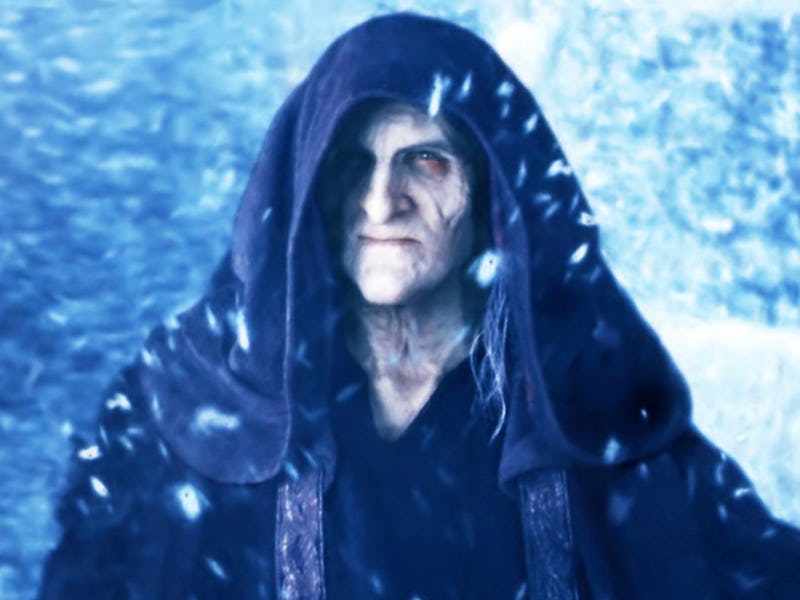The Best Stephen King Miniseries is Also the Most Obscure
King closed out the 20th century with one hell of a storm.

The Stephen King miniseries has never been a benchmark for consistency, particularly back when the horror maestro’s work became an annual staple of ABC’s ’90s schedules. For every It, there was a Langoliers. For every The Stand, there was a Tommyknockers. And who can forget how the man himself butchered his greatest cinematic adaptation, The Shining, in the name of prime-time entertainment? But the aptly named Storm of the Century proved to be his finest miniseries of the century.
Premiering 25 years ago, the three-parter occasionally resembles a King Greatest Hits. A malevolent outsider causes havoc in a small Maine community, a la Needful Things. The initial sense of chaos is centered in the local supermarket, as in The Mist. There are nods to Dolores Claiborne, in the shared hometown of Little Tall Island, and the isolating weather conditions are similar to those that exacerbated Jack Torrance’s slow descent into madness.
However, like 1991’s Twin Peaks-esque Golden Years, this was a rare King effort written specifically for the small screen. And with 257 minutes of airtime and a whopping $35 million at his disposal, the author was able to transfer his vision like never before.
King sets the anything-goes tone from the opening scene, as an elderly resident answers the door to a creepy stranger muttering ominous rhymes (“Born in lust, turn to dust”) before being fatally struck with her own walker. Instead of fleeing the scene, though, the murderer gets himself comfy and waits to be apprehended. He has several secret weapons: the ability to disclose the townsfolk’s deepest, darkest secrets, control their minds, and ultimately cause them to commit all kinds of brutal acts on each other and themselves.
It’s another typically unnerving premise, and one that allows Colm Feore’s Andre Linoge to stake his claim as one of the all-time great King villains. With his pitch-black eyes, ice-cold demeanor, and silver cane adorned with a wolf’s head that occasionally comes to life, the devilish figure oozes quiet menace from the moment he turns up on poor Martha Clarendon’s doorstep. He’s equally unsettling when shapeshifting into a crazed televangelist moralizing about the value of hospitality, and when he eventually reveals his true form: a wizened sorcerer who’s been roaming the Earth for thousands of years.
Colm Feore as the worst kind of town hall meeting attendee.
Pitching his performance somewhere between Dr. Seuss and Hannibal Lecter, Feore is a revelation as the chief tormentor who takes great glee in exposing the apparently upstanding community as a cesspit of abusers, adulterers, and all-around deviants. Interestingly, King keeps both the audience and the characters guessing about the motives for Linoge’s snow-capped reign of terror. “Give me what I want, and I’ll go away,” he insists during his early capture. But it’s only after he’s caused one individual to drown themselves in their bathroom sink and another to fatally bludgeon their boyfriend that his horrific demands become clear.
In fact, you have to wait until the town hall meeting in the final 40 minutes to discover Linoge will only be placated once he’s given a young child to raise as his successor. Should the town resist, then the collective nightmare they’ve all been experiencing will occur for real. Every surviving adult will walk into the ocean, and Little Tall Island will become the new Roanoke Colony, a mystery which it’s implied was also the evildoer’s handiwork.
It’s here where Storm of the Century evolves from a visceral psychological horror into a thought-provoking meditation on morality and mob rule arguably more terrifying than anything Linoge can conjure up. As supermarket boss, part-time cop, and general voice of reason Mike Anderson, Tim Daly is nothing short of heartbreaking as the lone individual unwilling to sacrifice an innocent kid for the greater good. His passion only grows when a random lottery determines his own son Ralphie (Dyllan Christopher) as the chosen one.
Another sign of King’s penchant for setting apocalyptic scenes in supermarkets.
King doesn’t shy away from the consequences of this Sophie’s Choice-esque dilemma, either. The town continues to be plagued by suicides of those unable to deal with the guilt of sending a four-year-old to the dark side. Mike splits with wife Molly (Debrah Farentino) over her accountability for their child’s fate, and in the final shot, we see a teenaged Ralphie, now fully under the grip of Linoge, flashing his fangs as he passes his father in the streets of Chinatown.
It’s still one of the biggest downer endings in King’s oeuvre. And yet, premiering shortly before Y2K, a time when the public was already attuned to the idea of some form of reckoning, the series averaged a remarkable 19.2 million viewers. Storm of the Century has since been hailed as a major inspiration for the writer’s most obvious successor, Mike Flanagan, particularly the fire and brimstone of Midnight Mass. King himself, a man famously hard to please, cited it as the best TV series to bear his name. Although Lisey’s Story, 11.22.63, and Castle Rock have since made strong cases, that argument may still stand.